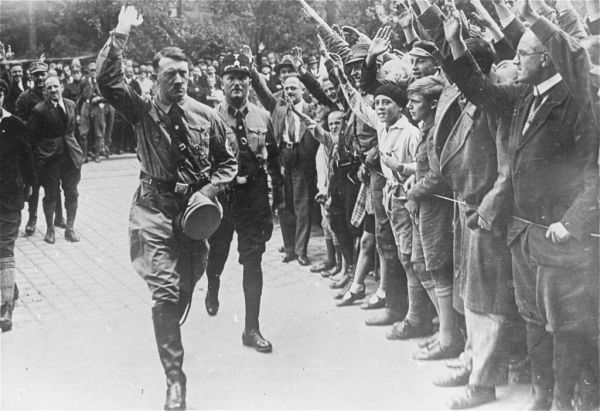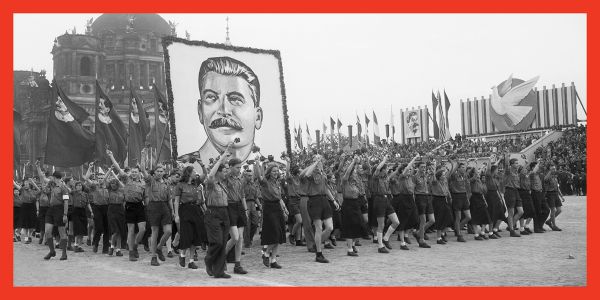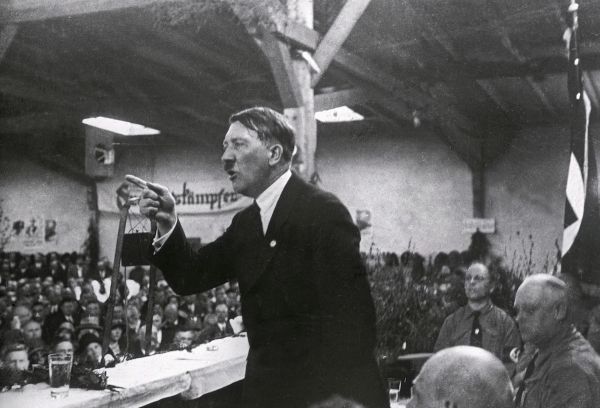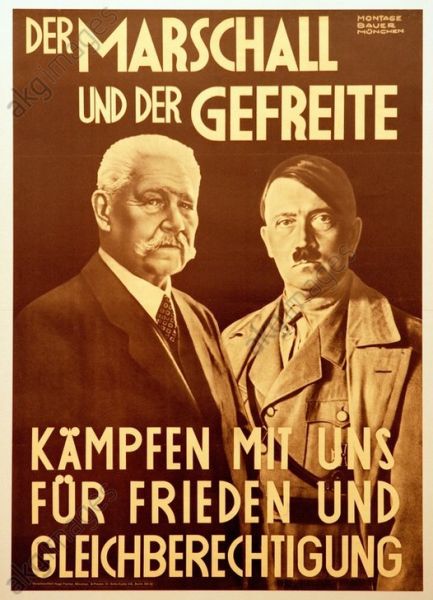The American Dictator Will Win in the Ballot Box
The American Dictator Will Win in the Ballot Box

Hitler greets supporters at a pre-1933 rally

A rally for Soviet Premier Joseph Stalin, post-War
Americans don't have an informed sense about dictators—enough to save us from one, should he appear. They expect him to announce his intentions well in advance, which no dictator in his right mind would ever do. They expect him to introduce himself to the public with a mouthful of hate-speech, which is also unlikely. They also expect him to seize power in the tradition of a good-old street-fighting revolutionary; but why do that if he can stand for an election and win it the good-old democratic way? Winning an election gives him constitutional control of law-enforcement and the military, and avoids unnecessary bloodshed. It is precisely what Adolf Hitler did.
Why foam at the mouth with hatred, if he can play on the longing of the public for a humanitarian? He will push national virtues: service to one's country, the unity and solidarity of the people, and he will build trust by selling himself as an intuitive problem-solver—using means not disclosed. The dictator may actually believe he is a humanitarian, and that he only uses dictatorial means in order to further the mandate of the people.
Americans have wearied of photos and newsreels of Hitler holding forth at a military parade with Swastika flags flying everywhere—since they can't understand a thing he's saying. They also don't care for newsreels of Soviet parades and Joseph Stalin waving benignly. Neither situation scares us particularly, and again, most Americans do not speak Russian. As dictators, Hitler and Stalin have an archaic character, complete with uniforms and flags a-waving. If anything, they reassure us that a dictatorship could never happen here.
The conventional wisdom says that we can let down our guard now, because we are wiser, thanks to Hitler and Stalin. Their exploits spoiled things for future wannabe-dictators. How could anyone fall for that trick again? But why couldn't a dictator succeed, if Americans don't have an informed sense of what the trick involves?
When Hitler was only candidate-Hitler and not dictator-Hitler, he did not actually push the partisan positions one would expect, that define the American perception of him. He pushed positive themes, reiterating that he was destined to lead Germany to power and self-respect among the nations of the world. He offered unity, a path to prosperity for the future, and self-respect, if the German people all would pull with him.
I know this because I have listened to some of his speeches. He gave hundreds of them; but there is a Before and an After in this thing—what candidate-Hilter said, versus what dictator-Hitler said. It's like separating the day from the night. The speeches I listened to are all Before-type speeches, that wooed the German public to trust him.
We are talking about life-and-death issues here. Germany had reached a spiritual and economic low by the time Hitler appeared. A quarter of the male adult population could not find a job, and had no means for supporting a family. Hitler took a stand that no other politician did. He addressed the fact that this was not politics as usual. He derided parlimentary formalities, constitutional dictates, and and all the other obstacles to implementing immediate measures to sustain and reassure a desperate population.
He must also have had shrewd staff-people to create a psychological profile of the German people. Hitler not only understood the feeling of helplessness and desperation of the German people, he also understood their psychological givens, their dreams, and their weaknesses. Hitler's handlers could also suggest to him the right words to use, to assuage their distress. As soon as he started speaking, that distinctive voice got their attention right away. As I listen to Hitler speak—hoarse and impassioned—I have to admit he is pretty good:

Adolf Hitler speaks at a pre-1933 rally
Here is a selection of quotes from Hitler's speeches:
1. "Germany's great day has dawned upon us! We have won power. Now we must persuade the German people! My comrades, I know that these are difficult times—when you desired change that never came; so we knew we had to continue the struggle. To succeed, you must join, and you must follow."
2. "What we dreamed about for years has finally come to pass! The unification of all Germans! The dawn of a new Reich. The standard for all German people. The most precious possession of a nation is its own people. And it is for their sake that we undertake the struggle. We must not lose courage. We must have faith!"
3. "A new sense of community has dawned in Germany. It is our most beautiful possession and our goal. We will reward those who commit themselves to the Socialist state. Our social welfare system is much more than charity, because we do not tell the wealthy, 'Please give something to the poor.'
"We say, 'Help yourselves, whether you are rich or poor.' Accept that someone else is worse off than you, and say, 'I want to help other Germans, as my comrades.'"
4. "If someone asks, 'Do I have to sacrifice much?' I say, 'Yes!' But that is the glory of a generous spirit. When you sacrifice for your community, you can walk with your head held high. Our belief in our nation is unshakable, and our determination is overwhelming. And when you combine faith and determination so ardently, then no force in the universe can resist you."
5. "In your youth, you must safeguard that which you possess—your comradery and solidarity of spirit."
We think that we could never fall for someone like that. Certainly Hitler's Wagnerian declamatory style is not our cup of tea, but his message is consistently positive, uplifting, and hopeful. It caught on with lost, desperate Germans like a wildfire. His simple frankness may elude cable-news talking-heads, but common people like me hear the thrill of it—a politician offering unity and self-respect so passionately. Someday, we will see how Americans deal with someone who mesmerizes, who is closer to home culturally.
The novelist and social critic Gore Vidal once wrote that politicians "must have an instinctive sense of 'occasion,' which is also the actor's art. . . . He is, in the purest sense, an opportunist." So the risk exists, no matter the traditions of the nation, because the human elements are immutable.
The Trick
Everyday, Americans complain about the nation's political divisions, or at least we hear about them from this politician or from that cable-news talking-head, and our reactions just add to the hue and cry of discontent—during relative prosperity; but while we complain, no one wants to rock the boat—not if our situation is better than in most countries.
Now imagine a time when things are not so good. As trends go, they indicate a worsening economy and riskier times ahead, facing problems within the nation and threats from abroad. Opportunity for betters jobs may decline, which will limit Americans' ability to increase their wealth and status, and they will begin to murmur. The divisions will no longer be so benign.
Cable-news talking-heads would sound out the public on the causes of America's decline, prompted by politicians seeking to capitalize on the divisions. Essentially, who can they convincingly blame for the decline? If they tune into bar-room conversations, country club chit-chat, church sermons, and labor union halls, they will hear that all of the groups have a beef against someone.
At this point, an apiring dictator will size up his chances and go for broke. If he has a socialist take on governing, chances are good that he will focus the blame on greedy industrialists, unscrupulous bankers, the big-wigs of the opposing party, and the business interests they promote. He will ask the question himself: "Who is helping the rich and powerful exploit the poor and helpless?"
If one studies Nazi propaganda, one cannot miss the recurring theme of a ruthless banker evicting a farming family or a single-parent household; or a ruthless businessman downsizing his workers or reducing their wages. Nazi political campaigns also focused a lot on themes like the "dictatorship of the money-bags" making Germans "hostage to big international capitalists." Illustrated publications showed greedy Jewish bankers—even a Jewish doctor fondling a female patient.
It daunted me to research the images and text of Nazi propaganda, and to listen to the trash-talking going on in America today, and to realize that the two situations overlap, showing how a wannabe-dictator smears a social class in a democratic society to turn the voting public against it. Most Americans need no extra orientation to understand the timeless utility of Nazi propaganda as the means to direct blame against an entire class of people.
As economic conditions in America worsen, the chorus of complainers grows more shrill, and the risk for voter-enabled dictatorial legislation increases—just as it happened in Germany during the Nazi era, with the wannabe-dictator serving as the go-to person to help the public dish out payback on the guilty parties.
At some point, the wannabe will tell you that crooks in the government and their sponsors in labor unions, privileged ethnic groups, and left-wing publications have sabotaged all the good work of the American people, causing it to decline in status. As the aggrieved public assesses its options, they unconsciously calculate how much of their natural civility they must sacrifice in order to dish out payback. The wannabe will mobilize you to action and lead you to do things you would never do in prosperous times.
You might think he has your best interests at heart. Instead, he plays both sides against the middle, and has little room in his heart for anyone but himself. The time will come when the dictator—now firmly installed in power, will take a lot of actions that you did not anticipate. You may mistrust the Jews or other minorities; but round them up and murder them in camps? This was not part of your plan.
But just how soon does the average citizen perceive that the actions of the dictator do not represent his wishes. In the case of the Soviet Union, the citizenry only hoped that the Soviet leaders would give them bread to eat. They did not know that the leaders would start a vendetta against each other that would decimate local leaders, state industry leaders, and the officer-class of the military.
Can anyone blame the average citizen for the atrocities of Stalin and others, the GULAG camps or the Secret Police? How much do the opinions, the secret wishes, of dreams of the public segue into the actions of a dictator? That ambiguity is the dictator's strength.
Political Disunity is Fertile Ground
Germany before the time of Hitler had one other risk-factor—deep political divisions. He only did what any sensible dictator would do: he did not resolve the disunity. He annihilated the opposition. Presto! No more disunity. What he did is not very different from what many in this country would like to do; and after all, you either tolerate the deleterious effects of the disunity, or you realize that only direct action will resolve it.
For that reason, many in Germany welcomed the leadership of Hitler. He ascended to power during a protracted civil war. There were many who missed the days of unity and civil order. They became the first to support Hitler's goal to unite the country by hook or crook. They sensibly concluded that ending the civil war would lead to recovered prosperity and peace.
Please read my excerpt of his speeches and ask yourself honestly if you would not respond to his goals today: unity and solidarity; peace in the streets; an end to ugly dissent.

Disunity in our country has not reached the level of disorder that Weimar-Germany experienced, but we have similar social divisions, with no end in sight. We have lived high on the hog and do not like having to detour around all the combat zones. With folks wanting to return to the good times—who knows what lies ahead? Politicians who exploit the social divisions will gain ground, the longer the division lasts, exactly as the Nazis did.
For most Americans, Republican or Democrat, the bourgeois society is where we live—the culture of consumer products, social status, and comfort, if not luxury. We like to have nice things to show our friends and impress everyone else. The bourgeois society loves peace and harmony. The citizen wants to go to work and receive a paycheck at the end of the week. He calculates whether he can afford a new car, a vacation at the beach, a swing-set, a flat-screened TV, or just pay off all his bills on time.
We expect honesty from others. They expect no less from us, in a bourgeois society comprised of our peers. But a dictator soon realizes he can exploit this presumption to his own ends, and promise to return the bourgeois society to business as usual. If we feel stressed enough by the circumstances, we might just go along with his plan.
Since when were Americans immune to the human failings of other countries? Most of us descend from those countries.
